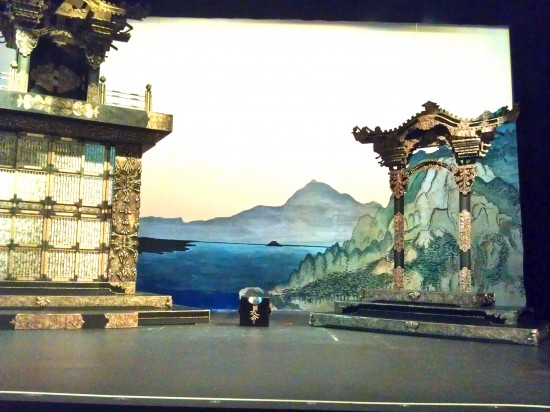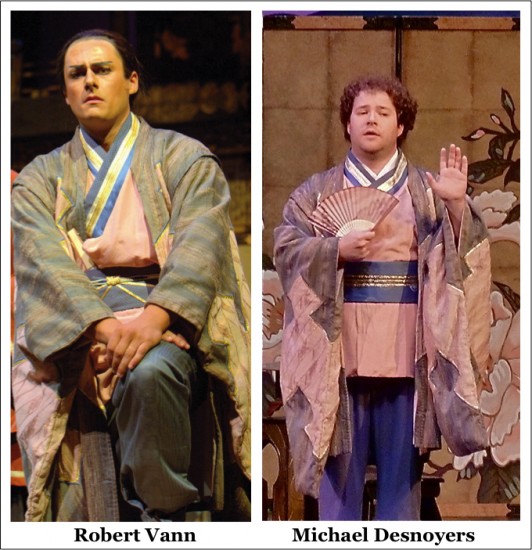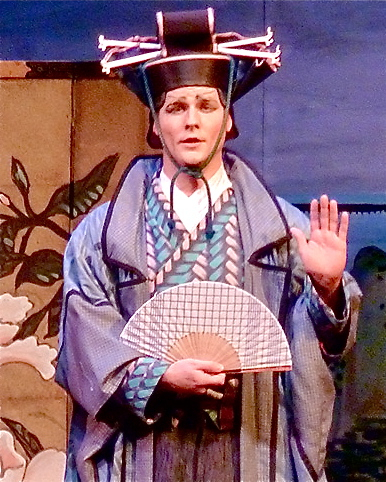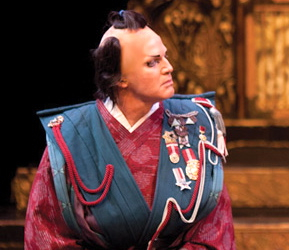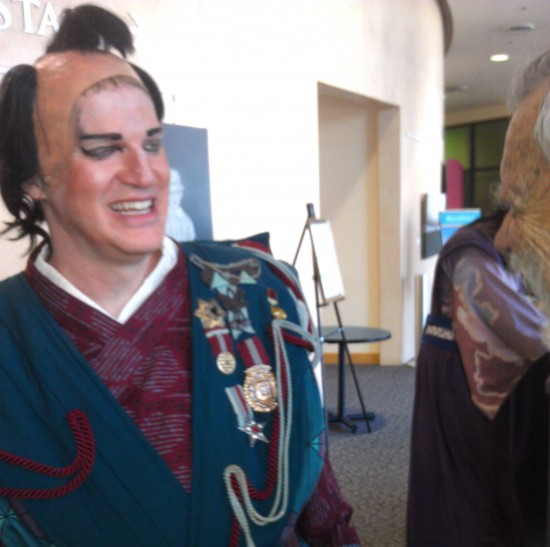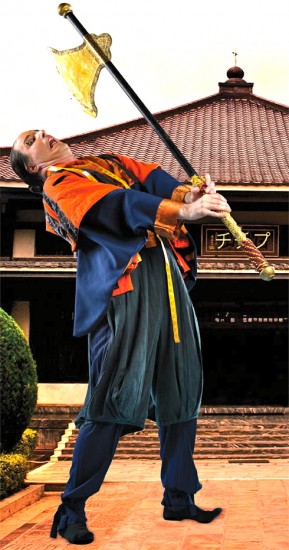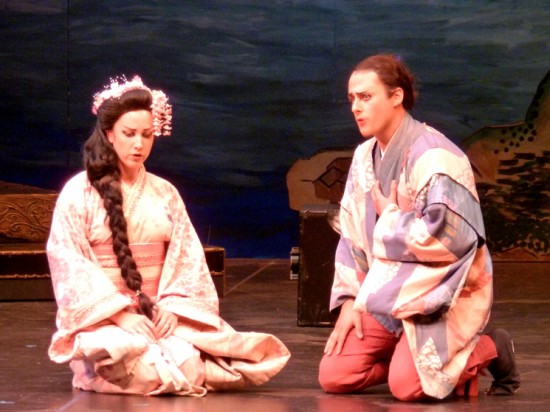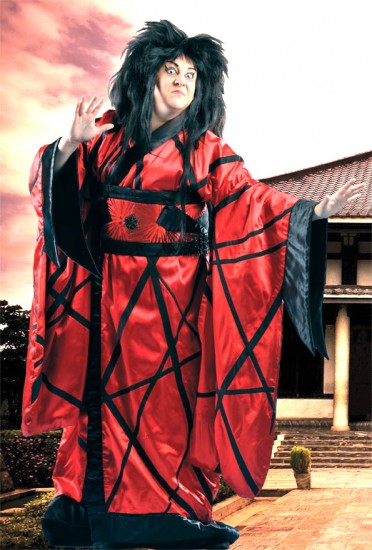The anticipation began when I saw the first poster for the Lamplighters’ 60th season and found that they would be performing The Mikado here in Mountain View Center for the Performing Arts.
From early last spring when I bought this year’s subscription I was sure I would enjoy The Mikado because (a) I am very familiar with the operetta and like every bit of it and (b) I have thoroughly enjoyed every other Lamplighters production I have seen in the last few years.
My anticipation grew as I walked into the theatre for the Piano Tech Rehearsal Friday night August 10, 2012 and viewed the open stage with its magnificent construction: the towering palace on the left, the impressive arch on the right. Kudos to Ric Tringali, the Set Designer.
And kudos to Stage Director Jane Erwin Hammett. Her over-all direction hit just the right balance preserving the original G & S libretto, with small gimmicks to keep a modern audience alert for the unexpected. And the blocking, entrances and exits all went off without a hitch, starting with the initial entrances of the men’s chorus singing
We figure in lively paint:
Our attitude’s queer and quaint �
You’re wrong if you think it ain’t, Oh!
and striking appropriate attitudes every few lines.
The first principal on stage was the male romantic lead, Nanki-Poo, with his show-stopper ballad A Wandering Minstrel I. Both romantic leads were double-cast; I heard Robert Vann on Saturday night August 11 and Michael Desnoyers at the Sunday matinee. Both tenors had sweet voices and excellent diction and were reasonably capable of expressing their emotions through their faces and body motion.
Nanki-Poo explains that a year ago he met Yum-Yum and
we loved each other at once, but she was betrothed to her guardian Ko-Ko, a cheap tailor, and I saw that my suit was hopeless . . . [until] I heard, a month ago, that Ko-Ko had been condemned to death for flirting!
Meanwhile Pish-Tush (John Melis) has entered unobtrusively. The role is essentially a “straight man” for the operetta. Pish-Tush has several songs and bits of dialog that are vital to the story, but has no personality of his own. John Melis plays him to perfection. In a typical Gilbert bit of convoluted logic he sings that (a) the Mikado decreed that flirting was a capital offense and was right, (b) a young man so convicted was right to object, and (c) the townspeople were right when
And so we straight let out on bail
A convict from the county jail,
Whose head was next
On some pretext
Condemned to be mown off,
And made him Headsman, for we said,
“Who’s next to be decapitated
Cannot cut off another’s head
Until he’s cut his own off.”
While Nanki-Poo is absorbing this unpleasant information, Pooh-Bah (Robby Stafford) enters with a wonderful self-introduction:
I can trace my ancestry back to a protoplasmal primordial atomic globule. Consequently, my family pride is something inconceivable. I can’t help it. I was born sneering.
Robby Stafford’s sneer as he delivered this line was something to behold. Pooh-Bah has more discouraging news for Nanki-Poo that he delivers in a rich baritone voice:
Young man, despair
Likewise go to,
Yum-Yum the fair
You must not woo.
It will not do:
I’m sorry for you,
You very imperfect ablutioner!
This very day
From school Yum-Yum
Will wend her way,
And homeward come,
With beat of drum
And a rum-tum-tum,
To wed the Lord High Executioner!
And the brass will crash,
And the trumpets bray,
And they’ll cut a dash
On their wedding day.
She’ll toddle away, as all aver,
With the Lord High Executioner!
Pooh-Bah’s mincing little dance step as he sings “toddle away” is in delightful contrast to his sneer.
In the lobby afterwards I greeted him by remarking, “You’re not sneering!” He told me that he had to conserve his sneer because if he held it too long his lip would start to tremble which, of course, would totally ruin its effectiveness.
It is always a pleasure to watch and listen to F. Lawrence Ewing. The man was born to play the lead comic in Gilbert & Sullivan operettas. In addition to the good baritone voice and exceptional diction required of any Ko-Ko, he has a ballet background that shows in his graceful movements, and particularly in the motions of his arms and hands.
Last year I saw his H. M. S. Pinafore as Lord High Admiral Sir Joseph Porter. He perfectly portrayed the absolute self-confidence of a born aristocrat – no need to flaunt his exalted rank – it’s just an obvious given. Here, in The Mikado, his every stance, motion, and expression show his lowly origin and his insecurity in his noble rank. It may sound like an oxymoron, but Ewing manages to bumble gracefully!
There’s a beautifully choreographed bit in which Pish-Tush is standing behind Ko-Ko, who seems to have questionable control over the executioner’s axe. Ko-Ko swings around suddenly – and Pish-Tush without seeming to notice the axe ducks his head just in time to avoid being decapitated.
Now, in a change of mood,
Three little maids who, all unwary,
Come from a ladies’ seminary,
Freed from its genius tutelary
come dancing and giggling on stage. Peep-Bo (Talia Levitan) is the realist of the three and Pitti-Sing (Molly Mahoney) is the most impish. All three voices blend beautifully, and Pitti-Sing is part of several trios and quartets. Incidentally, she is the only principal in the operetta who is making her Lamplighters debut. Yum-Yum, of course, is the female romantic lead and is sung by Moira McManus on Saturday and Lindsay Thompson Roush on Sunday. Both sopranos have expressive faces and are a pleasure to watch and listen to.
Following an amusing quartet by Pooh-Bah and the three maids, Yum-Yum and Nanki-Poo are left alone
where they embrace each other prefacing each motion by “This is what we’ll never do,” since Yum-Yum is engaged to Ko-Ko. First Nanki-Poo sings
Let me make it clear to you,
This is what I’ll never do!
This, oh, this, (kiss)
Oh, this, (kiss)
Oh, this, � (kiss)
This is what I’ll never, never do!
Then they alternate “Oh, this (kiss)” a few times. With every kiss a fan pops up for privacy and immediately pops back down – and Yum-Yum’s face emerges with a slightly more dazed expression. For the final kiss they drop their fans, he grabs her in his arms and leans forward bending her back nearly to the floor. They hold the kiss for several beats and when Moira McManus stands up her eyes are rolling around and stars are shooting from them in all directions – I know, that’s literally impossible, but I’ll swear that’s the impression she gives – and Lindsay Thompson Roush and the two males aren’t far behind.
Uh-oh. I’m almost out of space, I’m still in Act I, and I haven’t introduced a major character. Quickly then, Ko-Ko gets a letter from the Mikado decreeing that unless somebody is beheaded within one month the post of Lord High Executioner shall be abolished, and the city reduced to the rank of a village! While Ko-Ko is still trying to figure out how to cope with this decree, Nanki-Poo appears, intent on suicide since life without Yum-Yum is intolerable. Ko-Ko has an inspiration. A deal is struck. Everyone gathers on stage for the Act I Finale.
Ko-Ko announces that Nanki-Poo will be executed one month from today:
He yields his life if I’ll Yum-Yum surrender.
Now I adore that girl with passion tender,
And could not yield her with a ready will,
Or her allot,
If I did not
Adore myself with passion tenderer still.
Everyone is happy with this solution and sings and dances in celebration to some of Sullivan’s most joyous music.
Suddenly the music shifts into dire and somber mood and Katisha (Sonia Gariaeff) makes her appearance, last but not least. Not least in body, not least in voice, not least in malevolence, and not least in influencing the plot of the story. In stentorian tones she stills the merry throng:
Your revels cease! Assist me, all of you!
. . . .
I claim my perjured lover, Nanki-Poo!
Time’s up! But before I go, take a look at what a great actress Sonia Gariaeff is – with assists from Makeup Artist David Kirby and Wig and Hair Designer Rose Frazier. Compare the most unattractive old thing, With a caricature of a face, in the picture above with the lovely lady I spoke to in the lobby after the performance as shown below:
I know you’re anxious to know how this all plays out in Act II. If you live anywhere near the Bay Area, the best way to do this is go to the
Livermore Valley Performing Arts Center
Bankhead Theater
2400 First Street, Downtown Livermore 94550
Box Office: “�(925) 373-6800 Hours: Tues – Sat: noon – 6 pm;
Performance Days: 2 hours before show time;”� closed all major holidays.
Order tickets for this weekend August 25-26 and see for yourself. As an inferior second choice, come back to my blog sometime next week for part II of my review of The Mikado.
Except as noted, photos by Lamplighters staff: Joanne Kay, Charles Martin, and Lucas Buxman.
All quotes are from Web Opera.
This review by Philip G Hodge appeared in sanfranciscosplash.com on August 21, 2012.


